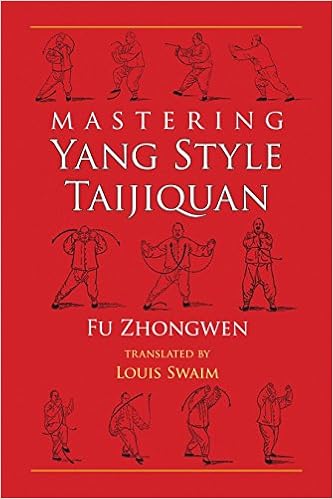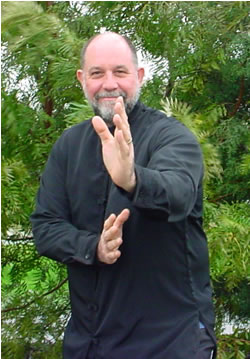Here is an blog post of mine from 2015. It pertains to learning a particular Taijiquan Form (e.g., Chen 18, Yang 24) from instructional DVDs and books:
The most frequent question I am asked is "Where I live there are no Taijiquan teachers of the the Taijiquan style X that I want to learn. How do I go about learning Taijiquan Style X?"
You always need to learn Tai Chi by observing someone doing the Taijiquan form you are studying, and listening carefully to their instructions. Fortunately, in 2015, for most Taijiquan forms, you have from two to ten different choices of very knowledgeable instructors or Masters who teach the Taijiquan form that you are learning by means of good instructional DVDs or videos. Also, for some popular Taijiquan forms there are excellent books or manuals available for the form you are learning, or very good online webpages on the form. Sometimes there are VCDs that can be played on a home computer. Finally, there are some online courses and UTube demonstrations of the form you are learning.
You are learning the "basics" from a good live teacher and/or a good writer. All Taijiquan is learned this way.
My own webpages provide extensive bibliographies of these many learning resources. I also provide many suggestions and remarks about learning specific forms using DVDs, videos, and books, e.g., Standard 24 Taijiquan Form.
Instructional DVDs come in NTSC and PAL formats, with NTSC format being used on DVD players in the United States. If you are purchasing your DVD from outside the United States it is most likely in the PAL format and will not work properly on your DVD player. Caveat Emptor.
I use a small desktop DVD player. My Vzon model, playing the NTSC format, has a hand held DVD controller and controls on the machine. I no longer use instructional VHS videos, because you can't as easily cue as with DVDs.
You want to purchase a DVD that teaches the Taijiquan form. You want an instructional DVD, not a demonstration DVD. Advanced Tai Chi students can sometimes learn from a demonstration DVD, but not without much difficulty. All Tai Chi learners can benefit from a good instructional DVD that breaks the form down into discrete sections (lessons, blocks) and provides detailed verbal instructions on how to perform the movements in each section. Sometimes a section is called a "lesson" and might include three or four movements of the form. The best instructional DVDs feature frequent repetition of a movement, clear voice over narration, the use of different camera angles for showing a movement sequence, sectional performance demonstrations, and complete demonstrations of the form from a front and back view. It is essential to get the narration in the language you use, because it is very hard to read subtitles and carefully study the the movements visually at the same time.
Study each DVD lesson carefully, make notes, memorize the names of the movements in that lesson, then immediately practice each lesson until you can perform the movement sequence in the lesson on your own. Repeat, repeat, repeat!! Don't move on to the next lesson until you can perform the movements in the lesson you are studying on your own. Give yourself a little slack and accept being just "satisfactory" at performing each lesson. Over time you will refine and perfect your performance.
After learning the first lesson, then proceed in the same manner to learn the second lesson. Then combine the first and second lesson and practice them together until you can perform them on your own. Don't move on to lesson three until you can easily and smoothly perform lessons one and two combined. To "learn" means to me to be able to remember and easily, consistently, and smoothly perform a sequence of movements on your own. Study Lesson 1, practice and learn Lesson 1; study Lesson 2, practice and learn Lessons 1 + 2; study Lesson 3, practice and learn Lessons 1 + 2 + 3; study Lesson 4, practice and learn Lessons 1 + 2 + 3 +4, etc.
As with all learning the keys are: daily study, careful study, paying attention, remembering, daily practice, patience, repetition, visualization, verbal cues, making notes, and confidence. Take your time, don't rush, be patient. The process of learning might take months.
Here are some suggestions from Robert Chuckrow:
"Whereas a form-instruction video is no substitute for a qualified teacher, those who live far from any teacher are still better off learning from a video than if they had no instruction at all. For those who have a teacher, a video can augment and accelerate the learning process. Finally, those who have had prior instruction in internal arts should be able to attain a substantial benefit from a video.
One method of learning a form from a video is to repeatedly do the entire form or blocks of the form along with the video. However, this method is not efficient because there is insufficient opportunity to reinforce each movement. A better way is to refrain from doing movement while watching the video. Rather, it is good to choose a small block of material, watch it a few times. Then, without any major physical action, visualize the sequence of movements as clearly as possible. Next, go back to the beginning of that block of material, and view and visualize it again a few times. Only after clear and complete visualization is achieved should the movements be attempted physically.
At first it will seem extremely difficult to work this way. With persistence, however, it is possible to achieve a level of visualization so intense that the imagined movements are almost as vivid as those seen on a TV screen. The dividends of the process of visualization are twofold: (1) By subduing the physical aspects of movement (e.g., balance, coordination, kinetic sense, timing), you can completely focus the mind on the details of the movement. (2) By cultivating the ability to visualize and mentally encompass complex details, you become increasingly able to observe and learn new movements quickly, especially in situations where it is not feasible to move while observing (e.g., dreams, teacher showing movements while the class watches). Referring to the dimension of self-defense, the more you can observe and mentally encompass the movements of the opponent, the greater the advantage achieved."
- Robert Chuckrow, The Tai Chi Book, YMAA Publication Center, Boston, MA, 1998, pp. 119–120















